Meditation techniques effectively alleviate stress and promote emotional balance. This article explores mindfulness meditation, loving-kindness meditation, and guided visualization. It addresses common challenges beginners face and highlights the unique benefits of meditation, such as increased emotional resilience and improved self-awareness. Regular practice can lead to lasting emotional stability and better stress management.
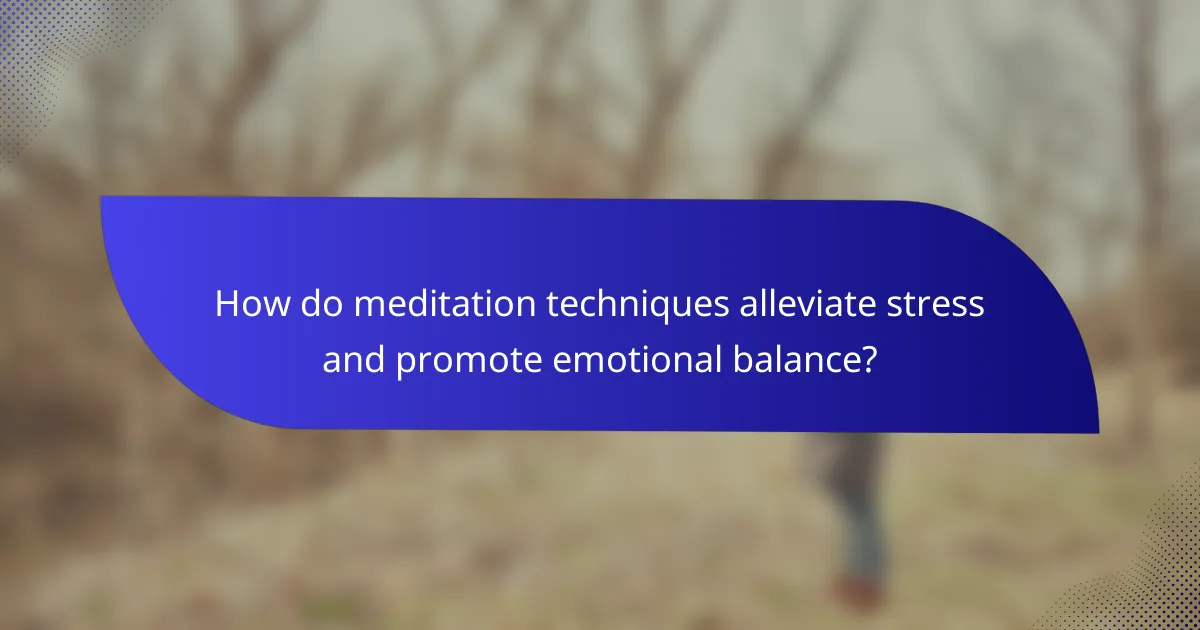
How do meditation techniques alleviate stress and promote emotional balance?
Meditation techniques effectively alleviate stress and promote emotional balance by fostering mindfulness and relaxation. These practices help reduce cortisol levels, enhance self-awareness, and improve emotional regulation. Techniques such as mindfulness meditation, guided imagery, and loving-kindness meditation have shown significant benefits. For example, mindfulness meditation can lead to a 30% reduction in perceived stress levels. Additionally, these techniques cultivate a sense of inner peace, allowing individuals to respond to stressors more calmly. Regular practice strengthens neural pathways associated with emotional resilience, making it easier to maintain balance in challenging situations.
Which physiological responses are influenced by meditation practices?
Meditation practices significantly influence various physiological responses. These include reduced heart rate, lower blood pressure, and decreased cortisol levels, which contribute to stress relief. Additionally, meditation enhances emotional balance by promoting neural plasticity and improving mood regulation. Regular practice can lead to increased gray matter density in brain regions associated with emotional regulation, further solidifying its positive effects on mental health.
What psychological benefits can be gained from regular meditation?
Regular meditation enhances psychological well-being by reducing stress, improving emotional balance, and fostering a sense of inner peace. It cultivates mindfulness, which helps individuals better manage their thoughts and emotions. Research shows that consistent practice can lead to decreased anxiety and depression levels. Additionally, meditation promotes self-awareness, allowing for greater emotional regulation and resilience. These benefits contribute to overall mental health and improved quality of life.
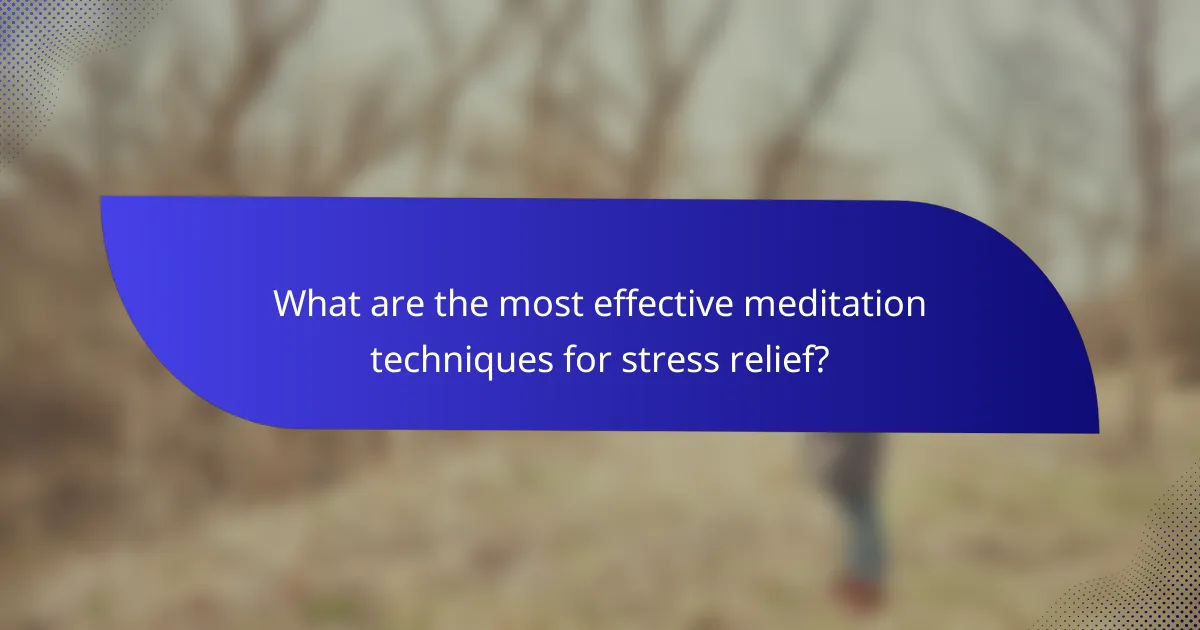
What are the most effective meditation techniques for stress relief?
Meditation techniques for stress relief include mindfulness meditation, loving-kindness meditation, and guided visualization. These methods effectively reduce stress and promote emotional balance.
Mindfulness meditation focuses on present-moment awareness, helping individuals detach from stressors. Research shows it can decrease anxiety levels significantly. Loving-kindness meditation fosters compassion and positive emotions toward oneself and others, enhancing overall well-being. Guided visualization involves imagining peaceful scenarios, which can lower cortisol levels and induce relaxation.
Practicing these techniques regularly can lead to lasting emotional stability and improved stress management.
How does mindfulness meditation specifically help with stress management?
Mindfulness meditation effectively reduces stress by promoting relaxation and enhancing emotional regulation. It fosters awareness of the present moment, which helps break the cycle of negative thoughts. Research shows that regular practice can lower cortisol levels, improving overall stress response. Additionally, mindfulness meditation cultivates self-compassion, which can mitigate feelings of anxiety and overwhelm. This technique encourages a non-judgmental observation of thoughts, leading to greater emotional balance and resilience.
What role does guided meditation play in emotional regulation?
Guided meditation significantly enhances emotional regulation by promoting mindfulness and self-awareness. It helps individuals recognize and manage their emotions effectively. Research indicates that regular practice can reduce anxiety and improve mood stability. Techniques like visualization and focused breathing cultivate a sense of calm, enabling better responses to stressors. As a result, practitioners often experience increased resilience and emotional balance.
Which breathing techniques enhance meditation effectiveness?
Breathing techniques such as diaphragmatic breathing, box breathing, and alternate nostril breathing significantly enhance meditation effectiveness. These methods promote relaxation, improve focus, and facilitate emotional balance.
Diaphragmatic breathing encourages deep, slow breaths that reduce stress hormones. Box breathing involves inhaling, holding, exhaling, and pausing for equal counts, which stabilizes emotions. Alternate nostril breathing balances the body’s energy and calms the mind.
Incorporating these techniques into meditation can lead to deeper states of relaxation and heightened awareness, ultimately improving overall well-being.
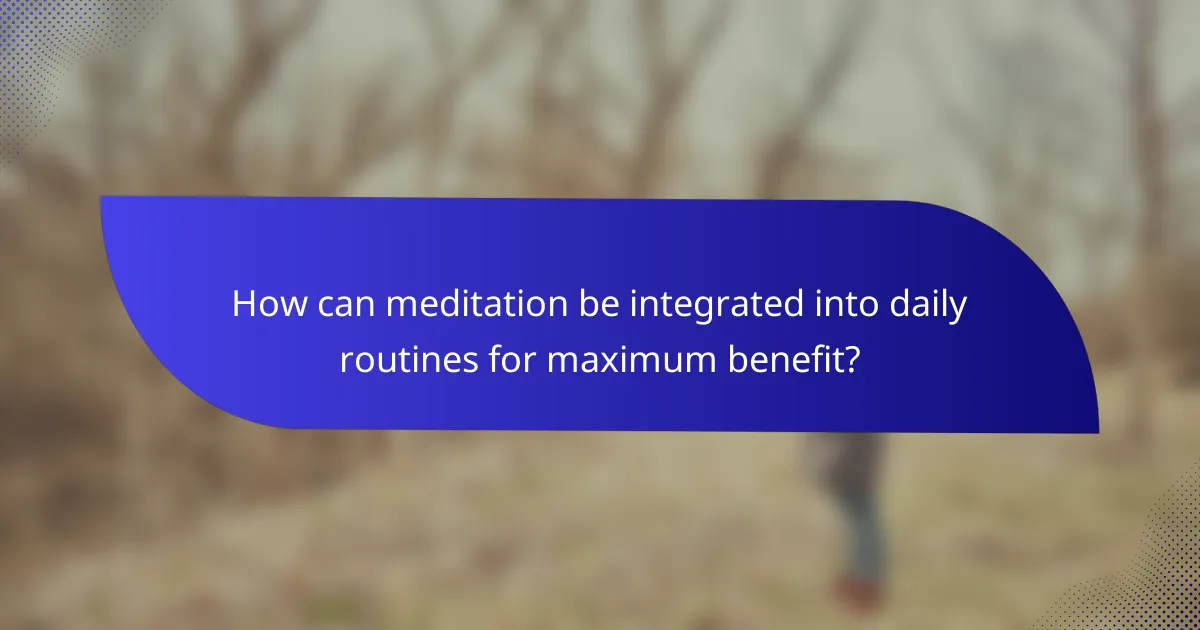
How can meditation be integrated into daily routines for maximum benefit?
Integrating meditation into daily routines enhances stress relief and emotional balance. Start with short sessions, gradually increasing duration as comfort grows.
1. Morning Mindfulness: Begin your day with five minutes of focused breathing or guided meditation.
2. Scheduled Breaks: Incorporate brief meditation sessions during work breaks to reduce stress.
3. Evening Reflection: End the day with a calming meditation to promote relaxation and emotional processing.
4. Mindful Transitions: Practice meditation during transitions, such as commuting or waiting in line, to maintain emotional balance.
5. Consistent Practice: Aim for daily meditation, establishing a routine that reinforces the habit and maximizes benefits.
These techniques foster a deeper connection to oneself, promoting overall well-being.
What are practical tips for establishing a consistent meditation practice?
To establish a consistent meditation practice, start with a set schedule and a dedicated space. Choose a time that suits your daily routine, and ensure the environment is quiet and comfortable. Gradually increase meditation duration, beginning with just a few minutes. Use guided meditations or apps to stay motivated and focused. Track your progress to reinforce commitment. Lastly, be patient and flexible; consistency develops over time.
How does the duration and frequency of meditation impact its effectiveness?
The duration and frequency of meditation significantly enhance its effectiveness. Regular practice, ideally daily, can lead to greater stress relief and emotional balance. Studies suggest that even short sessions of 10 to 20 minutes can yield benefits when practiced consistently. Longer sessions may deepen relaxation and mindfulness, but consistency is crucial for lasting impact.
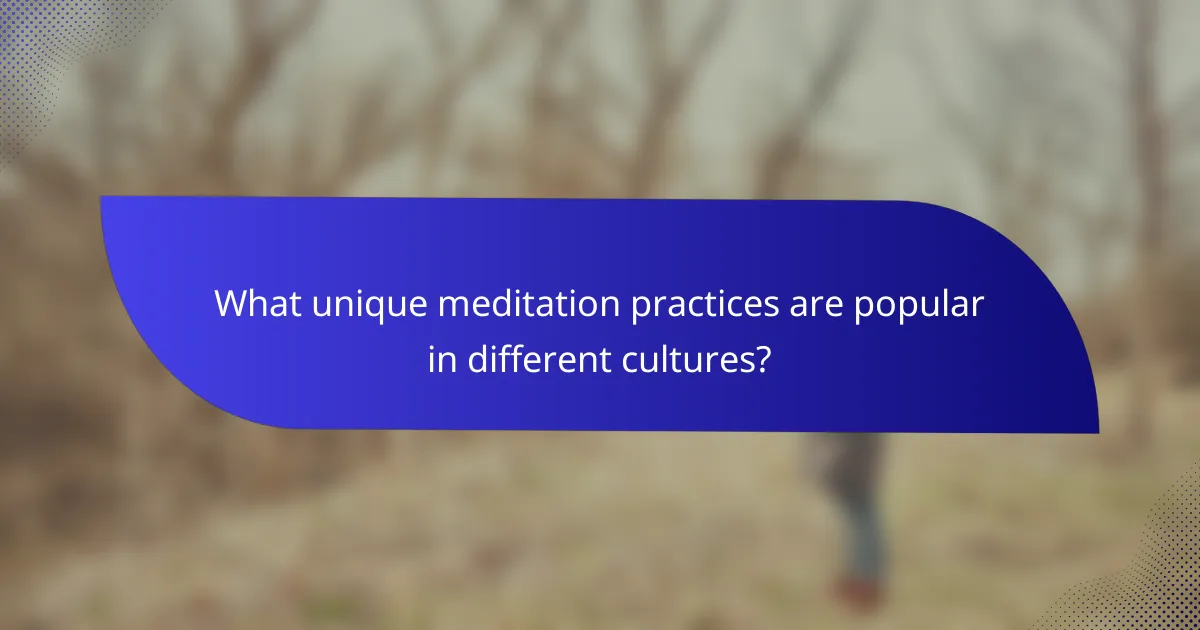
What unique meditation practices are popular in different cultures?
Various cultures have unique meditation practices that promote stress relief and emotional balance. These techniques often reflect the values and traditions of their respective societies.
One popular practice is Zen meditation from Japan, known for its emphasis on mindfulness and breath awareness. Another is Transcendental Meditation from India, which involves the repetition of a mantra to achieve a deep state of relaxation. In Tibetan Buddhism, visualization techniques are used to cultivate compassion and insight.
Additionally, the Native American tradition incorporates nature-based meditation, fostering a connection to the earth and spirituality. In contrast, the Chinese practice of Qigong combines movement, meditation, and breath control to balance energy. Each of these practices offers distinct benefits and approaches to achieving emotional well-being.
How does Transcendental Meditation differ from traditional mindfulness practices?
Transcendental Meditation (TM) differs from traditional mindfulness practices primarily in its technique and focus. TM utilizes a specific mantra-based approach, promoting deep relaxation and transcendence, whereas mindfulness emphasizes present-moment awareness through observation and acceptance. TM typically involves a structured 20-minute session practiced twice daily, which contrasts with the more flexible duration of mindfulness practices. Additionally, TM aims for a unique state of restful alertness, while mindfulness seeks to cultivate awareness of thoughts and feelings without attachment.
Which ancient techniques are still relevant in modern stress relief methods?
Ancient techniques like mindfulness meditation and breath control remain relevant for modern stress relief. These practices enhance emotional balance and promote mental clarity.
Mindfulness meditation, rooted in Buddhist traditions, focuses on present-moment awareness. Research shows it reduces anxiety and improves overall well-being. Breath control techniques, such as Pranayama from yoga, regulate breath patterns, fostering relaxation and reducing stress levels.
Incorporating these ancient methods into contemporary routines can lead to effective stress management. Many people find that regular practice yields significant emotional benefits, aligning with modern psychological approaches to mental health.
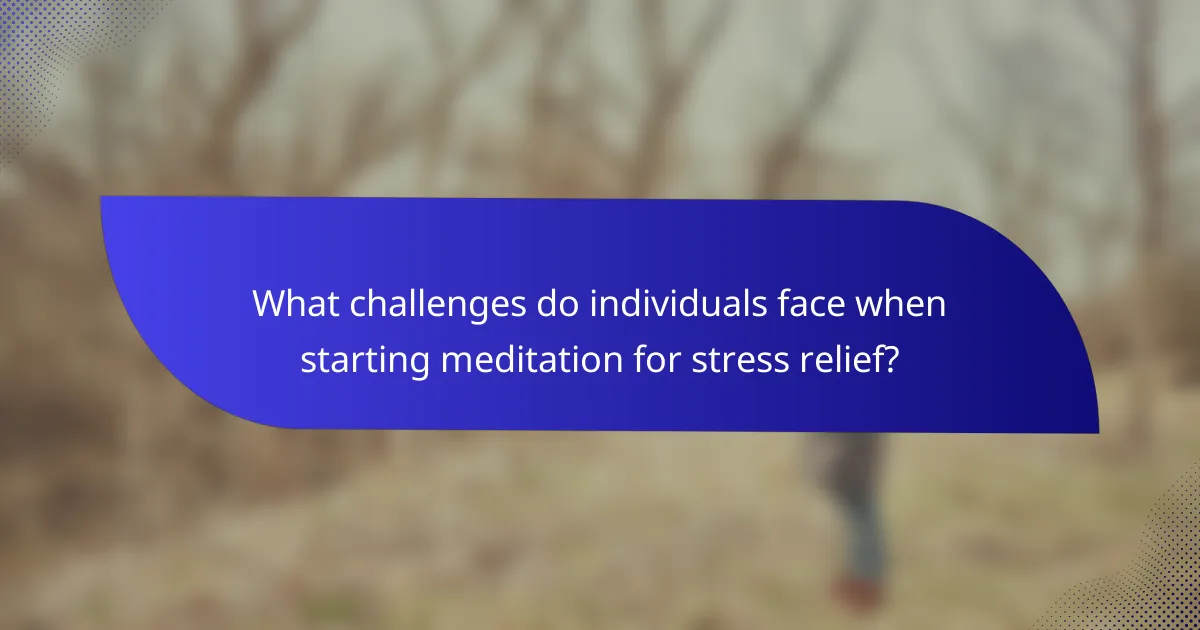
What challenges do individuals face when starting meditation for stress relief?
Individuals face several challenges when starting meditation for stress relief. Common obstacles include difficulty in maintaining focus, unrealistic expectations, and physical discomfort during practice.
Many beginners struggle with a wandering mind, making it hard to achieve a meditative state. As a result, they may feel frustrated or discouraged. Additionally, newcomers often expect immediate results, leading to disappointment when stress relief does not occur quickly.
Physical discomfort, such as tension or pain while sitting, can also hinder practice. This discomfort may deter individuals from continuing their meditation journey.
Finally, a lack of guidance or resources can leave beginners feeling lost, making it essential to seek out structured programs or experienced mentors.
How can common misconceptions about meditation hinder practice?
Common misconceptions about meditation can significantly hinder practice by creating unrealistic expectations. Many believe meditation requires a completely empty mind, which leads to frustration and discouragement. Others think it should produce immediate results, neglecting the gradual benefits that come with consistent practice. Misunderstandings about the time commitment can also deter individuals, as they may assume that effective meditation requires lengthy sessions. Additionally, some may view meditation as solely a spiritual practice, overlooking its practical applications for stress relief and emotional balance. These misconceptions can prevent individuals from fully engaging with meditation and reaping its true benefits.
What strategies can help overcome initial resistance to meditation?
To overcome initial resistance to meditation, start with short sessions and gradually increase duration. Create a comfortable environment to enhance relaxation. Use guided meditations to provide structure and ease anxiety. Establish a routine to foster consistency and make meditation a habit. Incorporate mindfulness into daily activities to reinforce the practice.
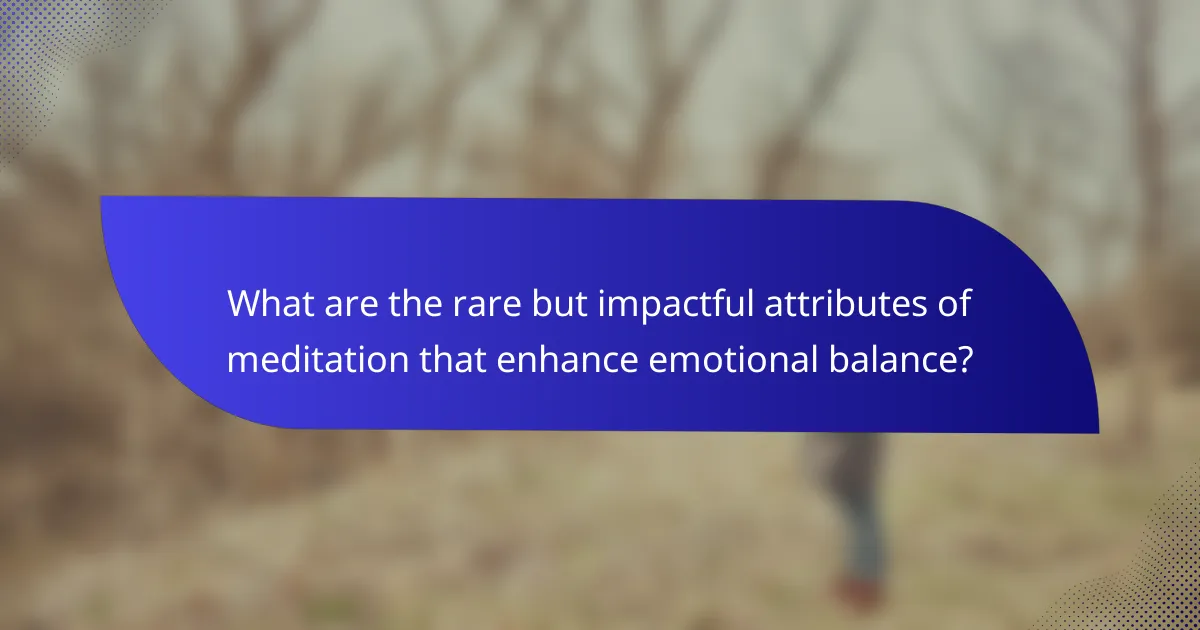
What are the rare but impactful attributes of meditation that enhance emotional balance?
Meditation offers rare attributes that significantly enhance emotional balance. These include increased emotional resilience, improved self-awareness, and heightened empathy.
Increased emotional resilience allows individuals to recover from stress more effectively, promoting a stable emotional state. Improved self-awareness enhances one’s understanding of emotions, leading to better emotional regulation. Heightened empathy fosters stronger interpersonal connections, contributing to emotional well-being.
These unique characteristics of meditation can lead to profound improvements in mental health and emotional stability.
How can meditation foster creativity and problem-solving abilities?
Meditation enhances creativity and problem-solving by promoting mental clarity and reducing stress. Regular practice encourages divergent thinking, allowing individuals to explore multiple solutions. Mindfulness techniques, such as focused breathing, can foster a calm state that enhances cognitive flexibility. Research shows that even short meditation sessions can lead to improved creative performance and innovative thinking.
What unexpected benefits have been reported by long-term meditators?
Long-term meditators often report unexpected benefits such as increased emotional resilience, improved focus, and enhanced creativity. These benefits arise from consistent practice, which fosters neuroplasticity and emotional regulation. Research indicates that long-term meditation can lead to structural changes in the brain, enhancing areas related to attention and self-awareness. Additionally, meditators frequently experience reduced anxiety and improved relationships, contributing to overall life satisfaction.
What expert tips can optimize meditation practices for stress relief?
To optimize meditation practices for stress relief, focus on consistency, environment, and technique. Establish a regular schedule to enhance familiarity and comfort. Create a serene space free from distractions to promote relaxation. Experiment with techniques such as mindfulness, guided visualization, or deep breathing to find what resonates best. Integrating these practices can significantly improve emotional balance and reduce stress levels.